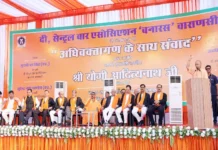
BANGALORE: Preparations are afoot for the upcoming “big-bang” Mars Orbiter Mission in October-November, an ambitious venture that would shed light on the possible existence of life on the planet besides boosting space agency ISRO’s brand equity.
The satellite, which would be launched on board Polar Satellite Launch Vehicle (PSLV-XL), will carry compact science experiments, totaling a mass of 15 kg, according to ISRO officials. There will be five instruments to study Martian surface, atmosphere and mineralogy.
Lyman Alpha Photometer (LAP) is aimed at studying the escape processes of Mars upper atmosphere through Deuterium/Hydrogen, Methane Sensor for MARS (MSM) would look to detect presence of Methane while Martian Exospheric Composition Explorer (MENCA) would study the neutral composition of the Martian upper atmosphere.
MARS Color Camera (MCC) would undertake optical imaging and TIR imaging spectrometer (TIS) is targeted to map surface composition and mineralogy.
“Mars Orbiter Mission (MOM) spacecraft integration is under progress”, an ISRO official told PTI here. “The spacecraft has to undergo qualification tests for proving space worthiness once the integration is completed”.
The mission would help ISRO understand the technological challenges of such an exploration, the possible existence of life and future colonization of Mars, which is the nearest planet which has most resemblance to earth. This would be India’s first mission to a distant planet.
ISRO will launch the mission in October-November. “If launched within the launch window (October 21-November 19, 2013), the spacecraft will travel for least distance to reach Mars”, the official said.
This is the immediate next available opportunity for such a mission as Earth and Mars would be coming closer then.
The PSLV-XL (PSLV-C25) will inject the spacecraft from the spaceport of Sriharikota in the 250 X 23000 km orbit.
After leaving earth orbit in November, MOM spacecraft will cruise in deep space for 10 months using its own propulsion system and will reach Mars (Martian transfer trajectory) in September 2014.
The 1350 kg spacecraft subsequently is planned to enter into a 372 km by 80,000 km elliptical orbit around Mars.
“The primary objective of this challenging mission is to establish the Indian technological capabilities to reach the orbit of Mars”, says ISRO Chairman K Radhakrishnan, also Secretary in the Department of Space. “A number of technological challenges need to be negotiated for a successful Mars mission”. -PTI






